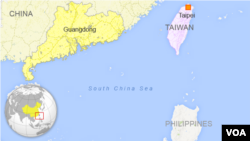Taiwan’s government aims to sign six new agreements with old political rival China despite mounting opposition at home. It will also step up communication with skeptics in the public and work more closely with parliament to promote its China ambitions.
Taiwan and China, political rivals of 65 years, intend to work out six new agreements on improving economic, investment and trade conditions. Wu Mei-hung, deputy minister of the Taiwan government’s Mainland Affairs Council, told VOA in an interview the deals should go ahead as long as lawmakers and common people are consulted.
The two governments hope to sign a far-reaching deal to cut import tariffs, establish consular-style offices in each other’s territories and find agreement on avoiding double taxation.
They may also sign pacts on investment dispute resolution, environmental cooperation and civil aviation safety. The two sides raised these issues at a meeting in early 2014 and Wu says progress is possible this year.
She says these are all items that could be discussed and signed as long as consensus is reached through communication inside Taiwan and through oversight of the legislature. Wu says that whether any deals are signed this year depends on progress in talks with mainland China as interaction is two-way, not just on Taiwan's side.
China has claimed sovereignty over self-ruled Taiwan since the Chinese civil war of the 1940s. Since President Ma Ying-jeou took office in Taiwan in 2008, the two sides have eased tensions and opened talks leading to 21 economic agreements.
But Ma's government faced mass protests last year for expanding relations with Beijing, and some analysts believe China policy hurt the ruling Nationalist Party in November local elections when it lost nine seats. Ma must step down in May next year due to term limits following a presidential race between the Nationalists and an opposition party that advocates more caution toward China.
Wu says Taiwan's government will overcome any public opposition to the next six deals by using clauses in a pending legislative bill that would call for more communication with the public on China policy and greater legislative oversight.
The deputy minister adds that China should help relations by respecting Taiwanese public opinion. Her ministry has found that 70 percent oppose Beijing's goal of unification under one country with two government systems and 80 percent prefer today's status quo of self-rule.
Wu says Taiwan has actually told mainland China about the public's viewpoints and that the mainland side understands. She says the mainland should show respect for people's reactions and take them seriously.
The government is on a tight schedule to win popular support. Voters will pick a new president next year and analysts say criticism of the government's China policy will hurt the Nationalist Party's election campaign.
Lai I-chung, vice president of Taiwan Think Tank, cautions of a more divided society if the Mainland Affairs Council proceeds with the six China deals. But he says the Nationalist Party seems determined to follow through on its China-friendly policies, despite the political fallout.
“They will probably just do whatever they wanted to do and that will create further fissures within the state. Right now the whole Ma government’s attitude is like this: I know I’m not going to be here again after 2016 in May so I’ll just do whatever I want,” said Lai I-chung.
Political observers say upsets in relations last year worried China but Communist leaders will keep working with Taiwan to lock in deals that they hope will help the island’s economy and in turn win votes for the Nationalists in the presidential election.




